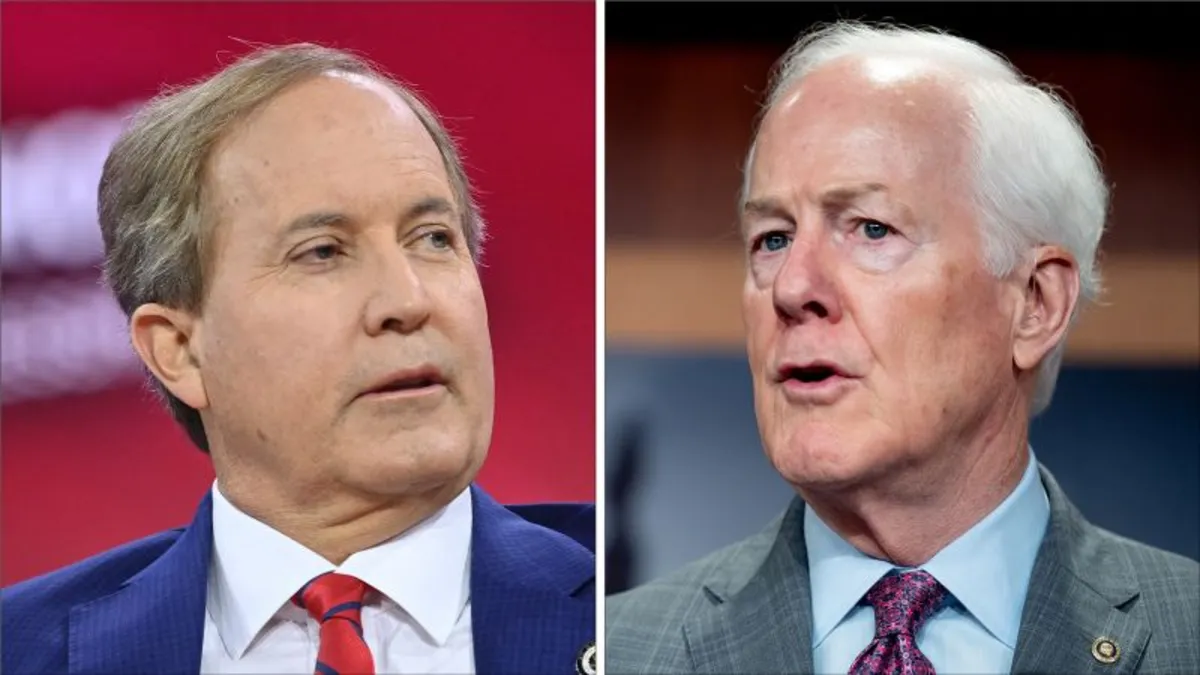
In a significant political maneuver, Texas Attorney General Ken Paxton and U.S. Senator John Cornyn, who is facing a challenge in the upcoming Republican primary, are leveraging their official capacities to pressure Democratic lawmakers who have absconded from the state. This strategic move is aimed at thwarting a GOP-led redistricting plan that has sparked considerable controversy.
On Friday, Paxton announced his intent to request the Texas Supreme Court to disqualify 13 House Democrats from holding office. He claims that these lawmakers have made "incriminating public statements" confirming their refusal to return, thereby providing grounds for his legal action. Paxton's lawsuit is unprecedented in its attempt to remove elected officials based on their absence during a legislative session.
In parallel, Senator Cornyn has called upon the Federal Bureau of Investigation (FBI) to assist in locating the absent Democrats. Cornyn confirmed on Thursday that FBI Director Kash Patel has assigned agents from Austin and San Antonio to follow up on his request for federal assistance. However, the role of the FBI remains uncertain, as the Democrats have not violated any federal laws by leaving Texas.
The ongoing standoff surrounding the mid-decade push by Republicans to redraw Texas’ congressional map is shaping the dynamics of next year’s U.S. Senate primaries for both political parties. Governor Greg Abbott has previously initiated a similar, narrower legal filing against Democratic Rep. Gene Wu, further intensifying the political climate.
In a press conference held in Illinois, Wu stated, “We will not be broken by these antics. We are not here to play games.” His sentiment reflects the determination of the Democrats to stand firm against what they deem to be unjust tactics.
Among those targeted in Paxton’s lawsuit is Rep. John Bucy III, who expressed via social media his resolve not to capitulate. Paxton has been active in seeking to enforce civil arrest warrants against absent Democrats, including filing an emergency petition in Illinois’ Eighth Circuit Court. This petition aims to make the warrants, signed by Texas House Speaker Dustin Burrows, enforceable in Illinois, where many Texas Democrats have congregated.
Moreover, Paxton filed a similar complaint in California, seeking enforcement of civil arrest warrants for Texas House Democrats who were reportedly in the state. However, a source familiar with the situation indicated that the lawmakers have since left California.
In another strategic move, Paxton is suing former U.S. Representative Beto O’Rourke and his political action committee, Powered By People, which has been financially supporting the travel expenses of Texas Democrats. Paxton's office is seeking a temporary restraining order and an injunction to prevent O’Rourke and his PAC from raising further funds for the Democrats.
On the Democratic side, several individuals involved in the quorum break are either running for Senate or contemplating their candidacy. State Rep. James Talarico has emerged as a spokesperson for the House members who fled, while O’Rourke continues to fundraise for the Democrats’ travel and accommodation expenses. Former U.S. Rep. Colin Allred, who has already declared his candidacy, is actively rallying Democrats against the redistricting efforts.
Talarico noted that his experiences during the quorum break will undoubtedly influence his potential Senate run. “I can’t imagine how it wouldn’t,” he told CNN, emphasizing the gravity of the current political situation.
The Texas House is scheduled to reconvene on Monday, with Speaker Burrows indicating that the Department of Public Safety will continue its efforts to enforce civil arrest warrants against the absent Democrats. Burrows asserted, “We are continuing to explore new avenues to compel a quorum.” He has also described punitive measures for those remaining outside Texas, including restricting access to a portion of their monthly operating budget and requiring in-person appearances for specific requests.
Governor Abbott has made it clear that he intends to call special session after special session, reiterating the urgency and importance of the redistricting agenda. Democrats have yet to determine how long they will maintain their absence to block the House from establishing a quorum. “We’re taking this one special session at a time,” Talarico stated, “and my colleagues and I have agreed to stay out of the state capitol for the next two weeks to challenge this rigged map.”
As the political landscape evolves, the implications of this standoff will undoubtedly resonate throughout the upcoming elections and shape the future of Texas politics.